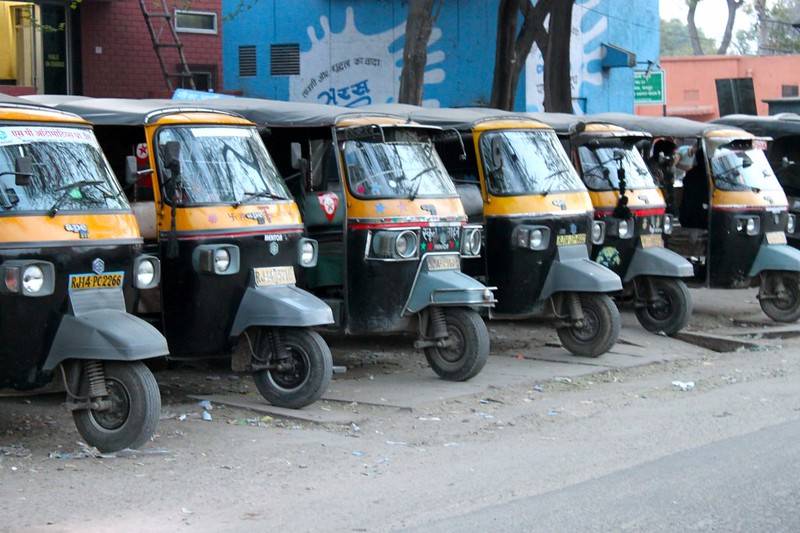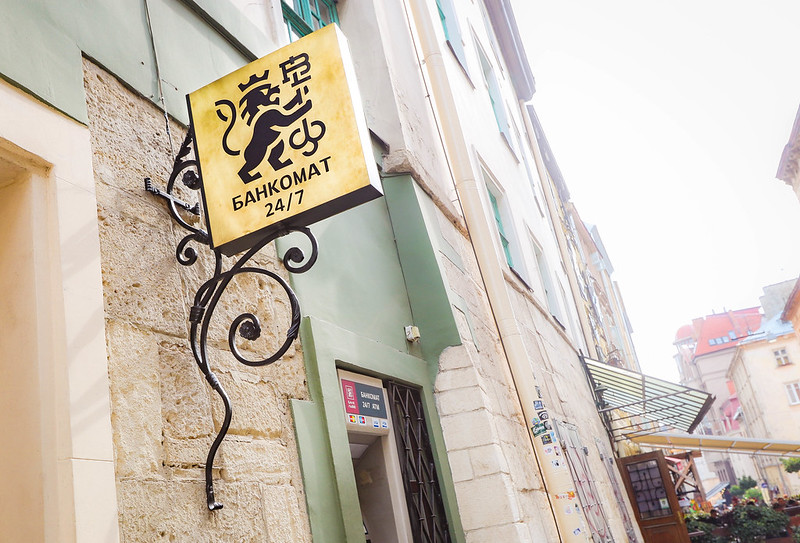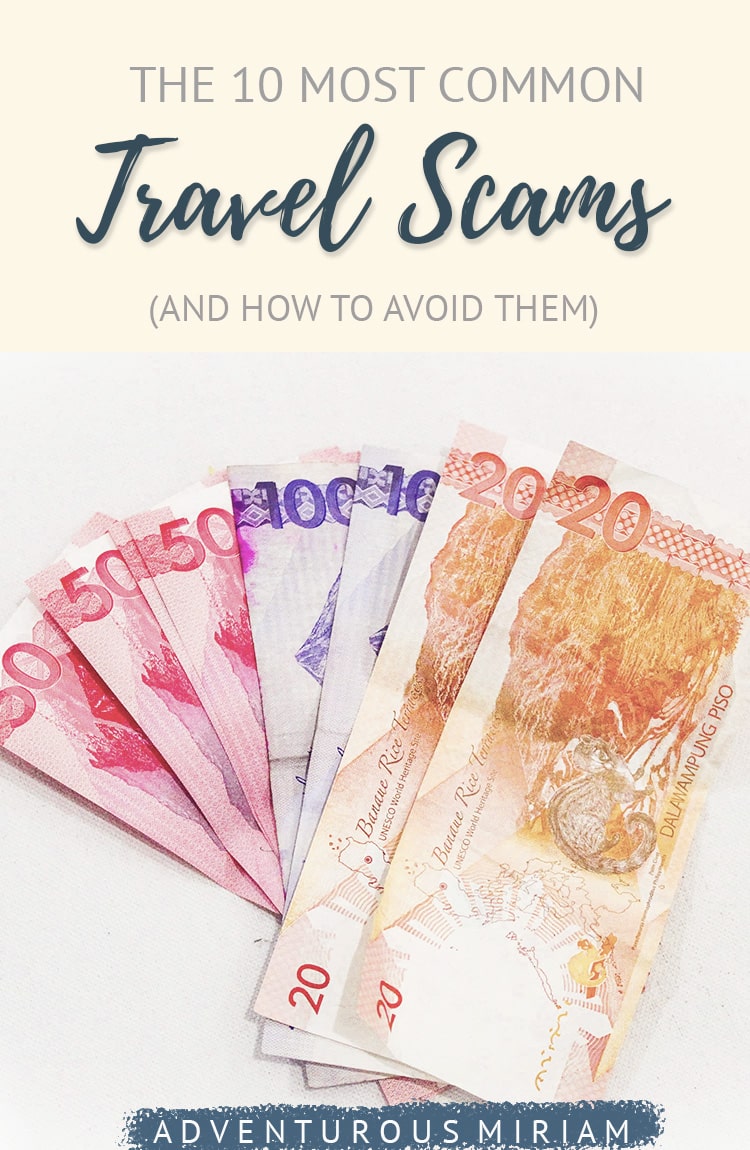10 common travel scams and how to avoid them

Where there are travellers, there are scammers. And, these days, there are a lot of travel scams to be aware of. To avoid getting taken advantage of, you need to be careful and know how to stay safe!
In this guide, I’ll walk you through the most common travel scams and how to avoid them. Let’s take a look at 10 travel scams to be aware of.
Read next: 27 essential travel safety tips everyone should know
This post contains referral links for products I love. Adventurous Miriam earns a small commission at no extra cost to you if you purchase through my links. I appreciate your support ♡ Learn more
Common travel scams
All of the scams I’m going to cover here are the most popular scams of 2023, and they’ll continue to be popular for years to come. They’ve been around for years and can hit even the most seasoned travellers. Even after 11 years of travelling, I can still get caught off guard and I have been scammed a few times before. That’s how I know exactly what to be aware of.
It’s all about knowing what to look out for to avoid getting ripped off. And remember – don’t worry about being impolite! These guys are trained to find your weak spots and make you feel uncomfortable, so you have to be firm!
1. Broken taxi meter
The scam
You hail a cab from the side of the street and are confused when the driver sadly explains that their meter is currently not working properly. But don’t worry, they know the route and how much it costs. And the price is very reasonable, he assures you. This is a scam taxi, and it can happen in both unlicensed and licensed cabs (licensed cabbies think they can get away with this with foreigners who don’t know any better).
How to avoid it
Before you even get into the taxi, ask how much the route will cost. When you get in, ask them to start the meter; if they don’t get out. If you’re staying at a hotel, or even a hostel, ask someone at the desk to call you a taxi from a proper taxi company.
Beware in these destinations
You’re most likely to find the scam taxi in Thailand, India, and possibly China as well. It’s a particularly common issue in Thailand, so keep your wits about you there.
Read next: 8 common taxi scams (and how to avoid them)

2. Closed hotels or attractions
The scam
A lot of taxi scammers work in cahoots with other people. Some will take you to a shop where they get a cut of whatever you buy. Others will tell you that the hotel you want is actually closed, insist on taking you to another one that they claim is better. This hotel is expensive, and the driver gets a cut of the money when you book a room.
How to avoid it
Simply insist that the hotel is open, and to be taken there anyway. Call your hotel or the attraction in advance to make sure they are open, and maybe even call them while you’re in the taxi to prove it to the driver if need be.
Beware in these destinations
This is one of those tourist scams that’s popular wherever there are taxis, but especially in Southeast Asia and India.
3. Free gifts (like flowers or bracelets)
The scam
This is one of the more sinister tourist scams, and one of the top scams in Southeast Asia. A person who looks innocent and vulnerable (usually a Buddhist monk or a disabled person) will offer you a gift. If it’s a bracelet, they’ll tie it to your wrist for you, and then they’ll demand payment. If you refuse, they’ll cause a scene and guilt or threaten you into paying. Needless to say, they are not real monks.
How to avoid it
Refuse any gifts on the street, and if they do manage to get it on your wrist, remove it and hand it back very clearly and defiantly. Show them with your actions that you know what this is.
Beware in these destinations
Most prominently anywhere that’s heavily Buddhist (but again, they’re not real monks) like Southeast Asia. But this also happens in cities like Paris and Barcelona. Here’s it’s usually a ring or a flower.

Damaged scooter
The scam
When you return your rented scooter, they claim that you’ve damaged it and you now have to pay for those damages. But it’s really old damages, and all of this has been planned. This is one of the top scams for making you feel scared because you don’t know how the law works in this country and getting out of this can be tough.
How to avoid it
Go into this knowing it could happen and take a few pre-emptive photos of the scooter before you set off to document previous damages and prove it wasn’t you. Use your own lock, not one provided by the rental guy (who may have a 2nd set of keys).
Beware in these destinations
This can happen anywhere with a lot of scooters, which is mostly Southeast Asia.
5. The donation scam
The scam
You enter a temple and, before you can explore, you find yourself in a room with an intimidating man or two asking for donations. You offer a little and they insist on more. This happened to me in Bali, and it’s not a fun experience.
How to avoid it
Know that this is one of those money scams, offer a small donation to appease them, show that you’re not intimidated, and you know what this is. Last, just walk away. Remember, they’re asking for a donation – which is always voluntary!! You don’t need to donate anything to enter!
Beware in these destinations
Bali and India are particularly bad for this scam.

6. Blessing scams
The scam
A person claiming to be a religious official, usually a Hindu brahmin (as was the case with me) begins a conversation, learns a little about your family, and offers blessings to them. Then demands money for those blessings.
How to avoid it
Keep your personal information to yourself, don’t encourage the conversation, walk away politely. If it gets heated, offer a little money and walk away quickly. If that doesn’t work, raise your voice and threaten to call the police. Be firm and authoritative!
Beware in these destinations
India and Indonesia are once again common places, and this is definitely one of the big travel scams to avoid.
7. Child beggars
The scam
This is similar to other money scams like the free gifts and blessings and it’s one of the more common scams the world over. Child beggars are placed strategically on the street by the mafia for guilty tourists to give them some money. But they’re not really beggars.
How to avoid it
Don’t make eye contact or get into a conversation, and just remember that the money doesn’t go to them. They go to the Mob.
Beware in these destinations
You’ll see this scam almost anywhere in the world, except Scandinavia.

The “helpful” stranger
The scam
A stranger asks to help you with a group photo, then runs off with your camera. Or he volunteers to help with the ATM, and pickpockets you or steals your card/code. Or he helps you with your bags at the airport or bus station, then demands a large payment afterwards.
How to avoid it
Don’t accept help unless you’ve asked for it first. Check your surroundings when you’re at an ATM and cover your PIN code. Keep a hand on your purse or wallet at all times.
Beware in these destinations
Southeast Asia and India are big problem areas for tourist scams like this one.
9. Counterfeit money
The scam
This is one of the big travel scams to avoid but it’s also a tough one to spot. When you’re in a store, a restaurant, or most commonly a taxi, the person you’re paying will either give you counterfeit money back or accuse you of paying with a counterfeit note. They will exchange it with your real note without you noticing.
How to avoid it
The only way to avoid this one is to know what the counterfeit and real money looks like and keep a close eye on your money. Get your cash from an ATM and when you receive change from a shop or taxi, check that it matches your other money. If they succeed in giving you change in counterfeit money, you’ll be in trouble when you then use that in a restaurant, so be very wary with this scam.
Beware in these destinations
This can happen in any restaurants or taxis in Southeast Asia, but many other countries, like India, can pull this scam, too.
10. ATM scams
The scam
There are a few top scams at play with ATMs. One is ATMs which have hidden cameras that photograph or record your card details and PIN number. Another is ATMs that swallow your card and effectively steal it.
How to avoid it
This is one of the most important travel scams to avoid. And it’s avoided by only ever visiting an ATM attached to a reputable bank. Don’t visit an unmarked ATM that’s nowhere near an actual bank. Cameras can still happen, though, so make sure to cover your PIN with your hand.
Beware in these destinations
This scam can happen anywhere but it’s particularly popular in India and China.

Have you ever been scammed? What happened?
More travel safety posts you might like
- Bali scams – and how to avoid them
- 8 common taxi scams (and how to avoid them)
- 27 essential travel safety tips everyone should know
- 20 solo female travel safety tips
- Do I really need travel insurance
- Which vaccines do I need?
- Travel Insurance (Review) – Do I REALLY Need It?
- 10 easy ways to treat Altitude Sickness (AMS)
Pin it







